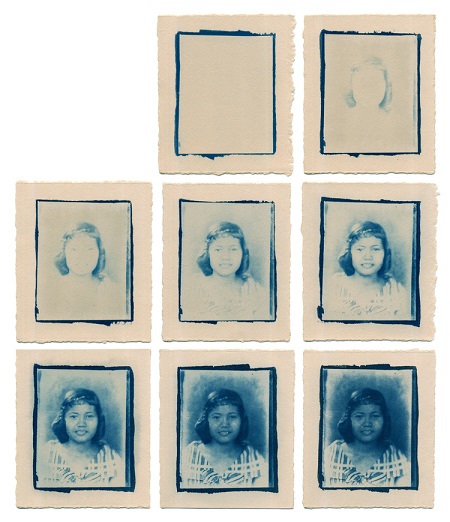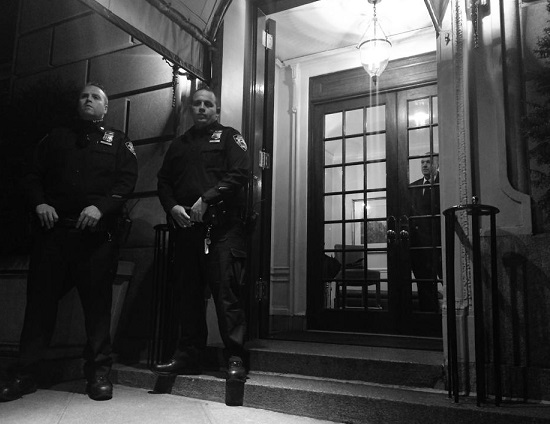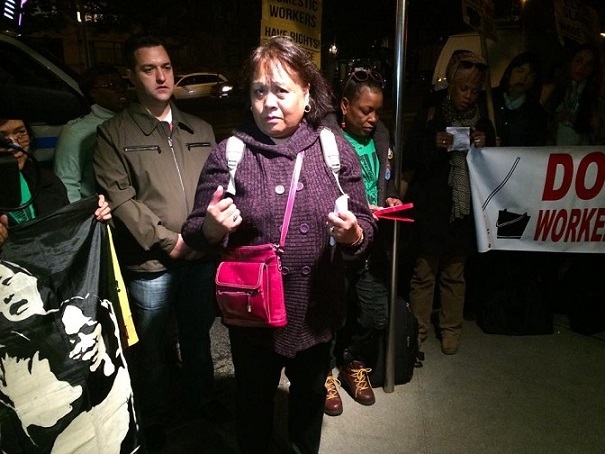INVESTIGATIVE REPORTING PROJECT: Marichu De Sesto was not terminated; she quit: lawyer (Part 2)
By Cristina DC Pastor925 Park Avenue is a pre-war residential co-op on the Upper East Side. Emphasis on ‘pre-war’ which connotes Manhattan luxury because of the apartments’ large rooms and high ceilings. In some units, there may be wood-burning fireplaces. This has been Elyse Slaine’s residence for at least 15 years.
On October 29, 2014, labor rights advocates from Damayan Migrant Workers and Justice First and supporters of Marichu De Sesto held a rally outside the ritzy building. Marichu was one of the placard bearers. She was there to personally deliver her demands asking to be paid her back wages of at least $75K. NYPD officers stood outside the gleaming French door as she handed her letter to someone inside the building.
There is a clear violation of federal and state labor laws, according to court papers filed by De Sesto’s lawyers Jyotin Hamid of Debevoise & Plimpton LLC; and Carmela Huang and David Colodny of the Urban Justice Center. She worked in excess of 40 hours a week and she did not receive payment for the hours beyond that.
“Both the FLSA and the New York Labor Law require that employers pay their employees 1 and ½ times their regular rate for all hours worked in excess of 40 during a work week,” the lawyers said in court papers. “Ms. De Sesto never received any overtime compensation from Defendants for her overtime work.”
They continued, “As of April 9, 2011, under New York state law, employers must provide employees with accurate pay stubs each time they pay wages.” The Slaines never provided pay stubs “throughout her employment.”
The document noted that De Sesto often received her salary late by at least two weeks. But since the couple divorced in 2010, the tardiness worsened. Elyse would “frequently wait one month or more before paying Ms. De Sesto her wages.”
De Sesto’s case is typical in the domestic work industry, according to the advocacy groups. A 2012 study by the National Domestic Workers Alliance (NDWA) resulted in the following conclusions that reflect the working condition of De Sesto and others working as nannies or housekeepers:
• 70 percent are paid less than $13 an hour.
• Domestic workers rarely receive employment benefits. Less than 2 percent receive retirement or pension benefits from their primary employer.
• 65 percent do not have health insurance.
• Domestic workers have little control over their working conditions. Employment is usually arranged without the benefit of a formal contract.
• 35 percent of domestic workers report that they worked long hours without breaks.
• Among workers who are fired from a domestic work job, 23 percent are fired for complaining about working conditions.
• Domestic workers, who are unprotected by contracts and laws fear employer retaliation.
Of the 200,000 domestic workers in New York, about 15 percent are Filipinos, said the grassroots organization Damayan, which has been advocating for Filipino migrant workers for about 13 years now. ‘Damayan’ is a Tagalog word which means “to offer help with compassion.”
Linda Oalican, the overall coordinator for Damayan, said New York has passed the Domestic Workers Bill of Rights in 2010, and “now is the time to enforce it.” She said lack of overtime pay and unpaid wages is tantamount to “wage theft” and is “unacceptable.”
“Respect and dignity for domestic workers is essential in the workplace, and employers must know that,” she said in a statement.
At the rally, Marichu addressed a crowd of about 50 supporters. She complained of being overworked. It’s all those long hours and almost non-stop chores, some light (eg. dusting, turning down the bed at night, etc.), others intense (eg. ironing, giving medication to the dogs, etc.).
“The work was sometimes too much for me, I am diabetic and my back pain has progressed after working for so many years. But I worked through it until I physically could not anymore,” she said.
Yari Osorio of Justice First said at the rally, “There are hundreds and thousands of Marichus throughout the city in a whole range of low-wage service work. Taking this action today is a way of letting them know that they too can fight back for their stolen wages.”
Lawyer Howard Davis of Meister Seelig & Fein, who is representing Elyse Slaine, stressed De Sesto was not terminated.
“She quit,” said Davis, who specializes in employment practices and policies, when reached by The FilAm.
Asked to comment on this statement to the New York Post made by Slaine’s spokesman — “Ms. De Sesto quit — she was not fired — after being told that she could not take off a weekend that she had previously agreed to work,” Slaine’s spokesman Arthur Schwartz said. Slaine later learned that De Sesto actually went to the Pocono Mountains that weekend, Schwartz said – Davis did not dispute the statement, but would not elaborate.
He maintained the defense will respond to the charges at the appropriate time, which is April 22. “We have numerous defense and counterclaims,” he said.
Part 1: Housekeeper sues Wall Street socialite for unpaid wages of over $75K
The FilAm’s Investigative Reporting Project is made possible through the generous support of our readers and contributors including the following:
Consuelo Almonte
Melissa Alviar
Amauteurish.com
Bessie Badilla
Sheila Coronel
Joyce and Arman David
Menchu de Luna Sanchez
Kathleen Dijamco
Jen Furer
Marietta Geraldino
Dennis Josue
Lito Katigbak
Rich Kiamco
Monica Lunot-Kuker
Michael Nierva
Lisa Esperame Nohs
Cecilia Ochoa
Rene & Veana Pastor
John Rudolph
Roberto Villanueva
2 anonymous donors














